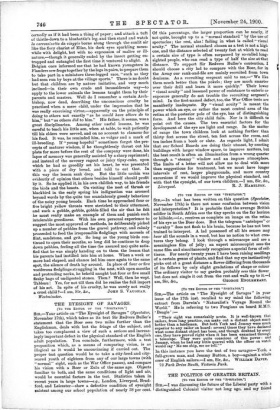THE EYESIGHT OF SAVAGES.
[TO THE EDITOR OF THE "SPECTATOR."]
SIR,—Your article on "The Eyesight of Savages" (Spectator, November 17th), which takes as its text Sir Redvers Buller's statement that the Boer sees two miles further than the Englishman, deals with but the fringe of the subject, and takes too complacent a view of such a serious and increas- ingly important defect in the physical standard of the English adult population. You conclude, furthermore, with a test proposition which, as a means of comparing vision, is as illogical as it would be unconvincing if carried out. The proper test question would be to take a city-bred and city. reared youth of eighteen from any of our large towns (with " normal " sight, such as the War Office passes), and compare his vision with a Boer or Zulu of the same age. Objects familiar to both, and the same conditions of light and air, would be essential factors in the test. Statistics taken in recent years in large towns—e.g., London, Liverpool, Brad- ford, and Leicester—show a defective condition of eyesight existent among our school population of nearly 38 per cent.
Of this percentage, the larger proportion can be nearly, if not quite, brought up to a "normal standard" by the use of spectacles ; the rest, alas ! failing in what is called "visual acuity." The normal standard chosen as a test is not a high one, and the distance selected of twenty feet at which to read a certain size of type is often surpassed by so-called long. sighted people, who can read a type of half the size at that distance. To support Sir Redvers Buller's contention, should choose a city lad to compare with the Boer, for in the Army our rank-and-file are mainly recruited from town denizens. As a recruiting sergeant said to me,—" We like them much better than the yokels; they are much smarter over their drill and learn it more quickly." Their lower "visual acuity" and lessened power of resistance to enteric or exposure generally do not trouble the recruiting sergeant's mind. In the first-named defect, too, the War Office tests are manifestly inadequate. By "visual acuity" is meant the power which an eye, or rather the most central area of the retina at the posterior pole of the eye, has of distinguishing form. And here the city child fails. Nor is it difficult, to point out the causes. The two essential factors for the development of the eye are light and range. In the matter of range the town children look at nothing further than thirty feet across the street, ten feet across the room, and ten inches from a book or slate. As regards light, I admit that our School Boards are doing their utmost, by erecting buildings with larger window space, to improve matters, but the best result is often an illumination from a wrong quarter through a " steamy " window and an impure atmosphere. The limits of a letter will not allow me to deal with more than suggestions for treatment, but we must have longer intervals of rest, larger playgrounds, and more country excursions if we would improve the physical standard, and with that the eyesight, of our town children.—I am, Sir, ckc.,










































 Previous page
Previous page